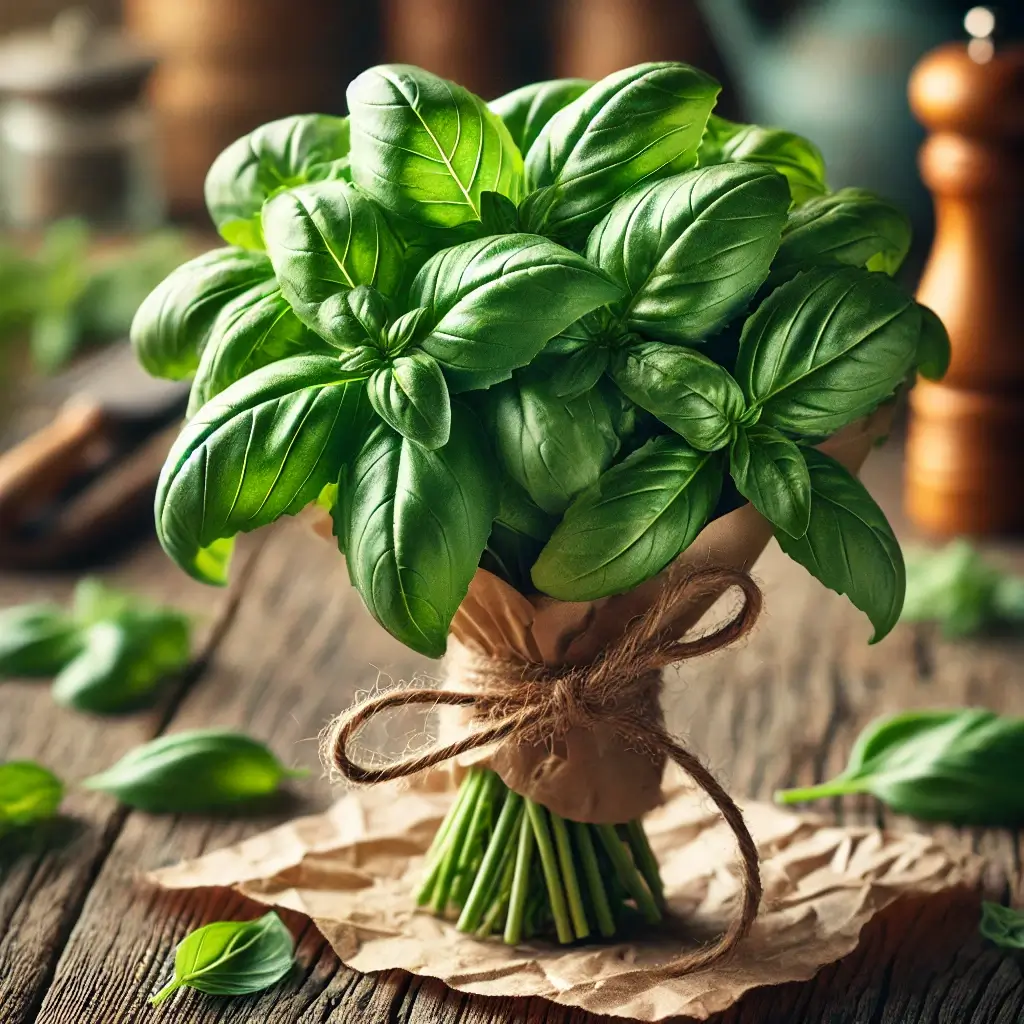Welcome to the Aromatic World of Basil: Nature’s Healing Powerhouse

A Leafy Wonder with Ancient Healing Roots
Basil isn’t just a humble garnish on pasta—it’s a revered herb with deep roots in ancient cultures and a potent healer in modern wellness. As we dive into the rich history, health benefits, and practical uses of basil, you’ll discover why this “king of herbs” deserves a place in your daily routine. Get ready to transform your health journey with basil’s magic!
1. Basil: More Than Just a Kitchen Herb
From sacred rituals in India to culinary masterpieces in Italy, basil has captivated people worldwide. In India, Holy Basil (Tulsi) holds a divine status in Ayurveda, known for its protective and healing properties. The Greeks and Romans aptly named basil “the king of herbs” for its potent effects.
Fast forward to today, basil remains a favorite among wellness enthusiasts and home chefs. What makes it so powerful? Its unique blend of essential oils, antioxidants, and adaptogenic properties help support overall well-being.
Culinary Inspiration:
Add basil’s vibrant touch to every meal! Try a Basil and Tomato Egg Scramble for breakfast, Pesto Pasta Salad for lunch, or a refreshing Lemon-Basil Chicken for dinner.
We Want to Hear From You!
How do you incorporate basil into your daily routine? Share your favorite basil-based recipes or traditions in the comments below!
2. Proven Health Benefits of Basil Backed by Science
a. Antioxidant Power to Combat Free Radicals
Basil is a rich source of antioxidants, including flavonoids, polyphenols, and eugenol. These compounds neutralize free radicals, protecting your cells from oxidative stress—a major contributor to aging and chronic diseases. Studies cited in “Healing Spices” by Dr. Bharat B. Aggarwal highlight basil’s ability to lower inflammation and disease risk.
b. Anti-Inflammatory Properties to Soothe Pain
Basil’s eugenol is a natural anti-inflammatory that can inhibit pro-inflammatory enzymes. Research in the “Journal of Molecular Sciences (2020)” confirms its efficacy in alleviating symptoms of arthritis, gut inflammation, and chronic pain.
Have you noticed any improvement in inflammation after adding basil to your diet? Join the conversation and share your experience!
c. Immune System Support
Packed with vitamins A, C, and K, along with immune-boosting minerals like zinc and iron, basil helps keep your defenses strong. Tulsi, or Holy Basil, has particularly potent antimicrobial properties, making it effective for fighting colds, coughs, and infections.
d. Stress Relief and Mood Stabilization
Feeling overwhelmed? Basil’s adaptogenic properties can help. As a natural stress-reliever, it regulates cortisol levels and promotes mental clarity. The adaptogenic properties of Holy Basil are highlighted in “Healing Spices”, showing its ability to enhance mood and balance.
Stress Tips:
Have you tried basil tea for stress relief? Let us know how you cope with stress using herbal remedies.
3. Exploring Different Basil Varieties for Health and Flavor
Basil comes in many varieties, each with its own unique flavor profile and health benefits:
- Sweet Basil (Ocimum basilicum): Classic Italian favorite, rich in antioxidants, ideal for culinary dishes and wellness smoothies.
- Holy Basil (Ocimum sanctum): Revered in Ayurvedic medicine, known for its adaptogenic and immune-boosting properties.
- Thai Basil (Ocimum basilicum var. thyrsiflora): Bold, peppery flavor with antibacterial benefits—perfect for Thai cuisine.
- Citrus Basil Varieties (Lemon and Lime): Add zest and antioxidants to dishes, great for detox waters and salads.
Your Turn:
What’s your favorite basil variety? Share your tips for growing, cooking, or using basil for wellness!
4. Practical Tips to Maximize Basil’s Health Benefits
- Fresh vs. Dried: Fresh basil has higher levels of antioxidants. Add it raw to salads, sandwiches, or smoothies for maximum benefits.
- Tea Time: Brew Holy Basil tea to relieve stress and boost immunity. Simply steep a few leaves in boiling water and enjoy its adaptogenic effects.
- Skin and Hair Benefits: Basil-infused oil or fresh basil paste can treat acne, soothe skin irritations, and promote scalp health.
- Infused Detox Water: Boost hydration with basil-infused water (recipe below).
Have You Tried These?
Tell us your favorite ways to use basil for wellness!
5. DIY Recipe: Basil-Infused Detox Water for Natural Healing
Elevate your hydration game with this simple recipe:
Ingredients:
- 1 cup fresh basil leaves (choose any variety)
- 4 cups filtered water
- Optional: lemon or cucumber slices
Instructions:
- Wash and gently crush basil leaves to release oils.
- Place in a jar or pitcher, add filtered water.
- Infuse overnight in the refrigerator.
- Strain and enjoy a refreshing, healing drink.
Experiment and Share!
Tried this recipe? Share your experience and any variations you created.
6. Common Questions About Basil
Q: Does cooking basil destroy its nutrients?
A: Light cooking reduces some volatile compounds but can enhance others, such as carotenoids. Use a mix of fresh and cooked basil to get maximum benefits.
Q: What’s the difference between Holy Basil and Sweet Basil?
A: Holy Basil (Tulsi) is primarily used for therapeutic purposes, while Sweet Basil is common in culinary dishes. Both offer unique health benefits.
Your Questions Answered:
Got more questions about basil? Leave them below and we’ll cover them!
Conclusion: Embrace Basil’s Healing Powers Today
Basil is much more than a flavorful herb—it’s a potent health ally. From boosting immunity to reducing stress and inflammation, basil deserves a permanent spot in your wellness routine. Start exploring the endless possibilities this “king of herbs” offers and transform your health journey today!
